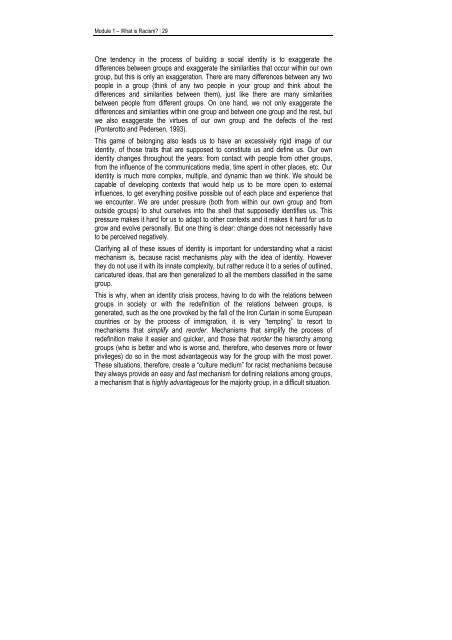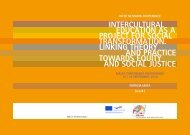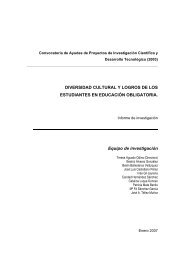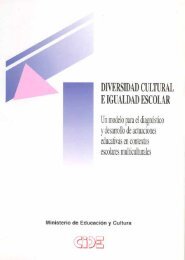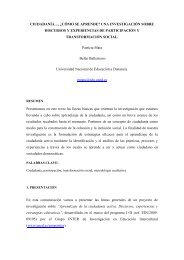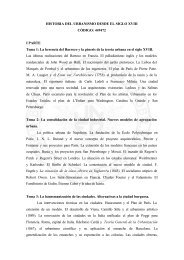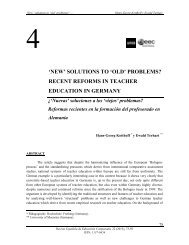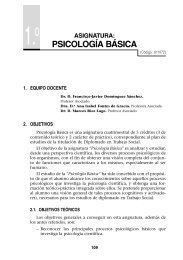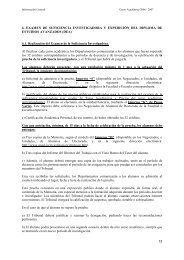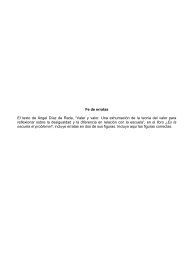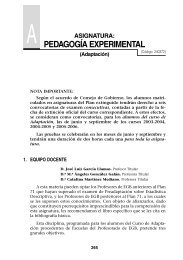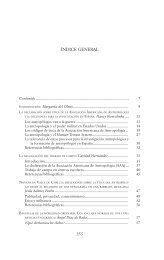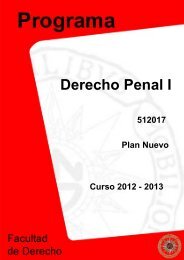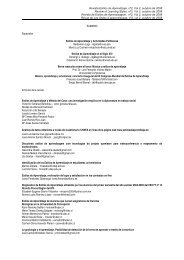Racism: What It Is and How to Deal with It - Uned
Racism: What It Is and How to Deal with It - Uned
Racism: What It Is and How to Deal with It - Uned
You also want an ePaper? Increase the reach of your titles
YUMPU automatically turns print PDFs into web optimized ePapers that Google loves.
Module 1 – <strong>What</strong> is <strong>Racism</strong>? | 29<br />
One tendency in the process of building a social identity is <strong>to</strong> exaggerate the<br />
differences between groups <strong>and</strong> exaggerate the similarities that occur <strong>with</strong>in our own<br />
group, but this is only an exaggeration. There are many differences between any two<br />
people in a group (think of any two people in your group <strong>and</strong> think about the<br />
differences <strong>and</strong> similarities between them), just like there are many similarities<br />
between people from different groups. On one h<strong>and</strong>, we not only exaggerate the<br />
differences <strong>and</strong> similarities <strong>with</strong>in one group <strong>and</strong> between one group <strong>and</strong> the rest, but<br />
we also exaggerate the virtues of our own group <strong>and</strong> the defects of the rest<br />
(Ponterot<strong>to</strong> <strong>and</strong> Pedersen, 1993).<br />
This game of belonging also leads us <strong>to</strong> have an excessively rigid image of our<br />
identity, of those traits that are supposed <strong>to</strong> constitute us <strong>and</strong> define us. Our own<br />
identity changes throughout the years: from contact <strong>with</strong> people from other groups,<br />
from the influence of the communications media, time spent in other places, etc. Our<br />
identity is much more complex, multiple, <strong>and</strong> dynamic than we think. We should be<br />
capable of developing contexts that would help us <strong>to</strong> be more open <strong>to</strong> external<br />
influences, <strong>to</strong> get everything positive possible out of each place <strong>and</strong> experience that<br />
we encounter. We are under pressure (both from <strong>with</strong>in our own group <strong>and</strong> from<br />
outside groups) <strong>to</strong> shut ourselves in<strong>to</strong> the shell that supposedly identifies us. This<br />
pressure makes it hard for us <strong>to</strong> adapt <strong>to</strong> other contexts <strong>and</strong> it makes it hard for us <strong>to</strong><br />
grow <strong>and</strong> evolve personally. But one thing is clear: change does not necessarily have<br />
<strong>to</strong> be perceived negatively.<br />
Clarifying all of these issues of identity is important for underst<strong>and</strong>ing what a racist<br />
mechanism is, because racist mechanisms play <strong>with</strong> the idea of identity. <strong>How</strong>ever<br />
they do not use it <strong>with</strong> its innate complexity, but rather reduce it <strong>to</strong> a series of outlined,<br />
caricatured ideas, that are then generalized <strong>to</strong> all the members classified in the same<br />
group.<br />
This is why, when an identity crisis process, having <strong>to</strong> do <strong>with</strong> the relations between<br />
groups in society or <strong>with</strong> the redefinition of the relations between groups, is<br />
generated, such as the one provoked by the fall of the Iron Curtain in some European<br />
countries or by the process of immigration, it is very “tempting” <strong>to</strong> resort <strong>to</strong><br />
mechanisms that simplify <strong>and</strong> reorder. Mechanisms that simplify the process of<br />
redefinition make it easier <strong>and</strong> quicker, <strong>and</strong> those that reorder the hierarchy among<br />
groups (who is better <strong>and</strong> who is worse <strong>and</strong>, therefore, who deserves more or fewer<br />
privileges) do so in the most advantageous way for the group <strong>with</strong> the most power.<br />
These situations, therefore, create a “culture medium” for racist mechanisms because<br />
they always provide an easy <strong>and</strong> fast mechanism for defining relations among groups,<br />
a mechanism that is highly advantageous for the majority group, in a difficult situation.


